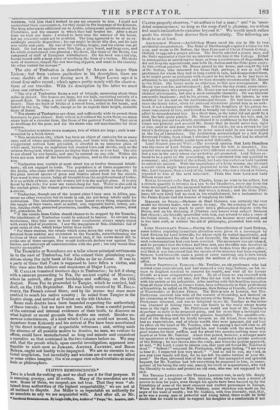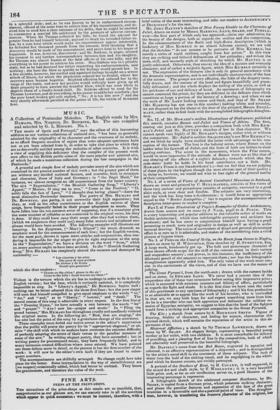CLIFFE'S REMINISCENCES.*
This is a book for cutting tip, and we shall use it for that purpose. It is amusing, gossipy, and ill-written. Many of the anecdotes are not new. Some of them, we suspect, are tot true. That they were "ob- tained from authotitiea of the highest respedtability," we are not at all itielined to dispute. Joe Miller is as repeetable an authority for an anecdote as any we are acquainted with. And after ati, as Mr. • 'Anecdotal Iteigiu- "seeices. fly Leigh 'Cilia, Esq. Author of " j'arga," &c, isoadon, 1830. CLIFEE properly observes, " an author is but a man ." and " in 'anec- dotal reminiscences,' so long as the coup deed is pleasing, we seldom feel much inclination to examine beyond it." We would much rather quote his stories than discuss their authenticity. The following are
fresh to us at least. •
ARCHBISHOP Mociar.—Archbishop Moore owed his rise in life to two accidental circumstances. The Duke of Marlborough required a tutor for his sons, and wrote to Dr. Sutton, the then Principal of Christ Church College, Oxford, to appoint a proper person. The Doctor selected a young than, and the Duke appointed a time for an interview with him at the College. Either in consequence of mistakingthe hour, or from a careleseness of disposition; he did not keep the appointment, and both Dr. Sutton and the Linke grew imgryi At this critical juncture Mr. Moore passed by the house, and catight the aye of Dr. Sutton, who informed his Grace that, perhaps, it was as wail thtt gentleman for whom they had so long waited in vain, had disappointed nerd, as he might prove RS negligent with respect to his duties, as he had been in . attending to his appointment, and he then strongly recommended Mr. Moore • to the Duke. His Grace made no objection to thiS new arrangement. Mr. Moore was sent for, and introduced ; and, before the day closed, every tirces- sary preliminary was arranged. Mr. Moore was not only a man of very great classical attainments, but also a most estimable character. He was likewise eminently handsome ; and to his person, rather than to his talents, he was indebted for his seat on the Archiepiscopal throne. lie had been some few years the family tutor, when his personal attractions placed him in an awk- ward, if not a dangerous situation. One of the daughters of his patron be- cause enamoured of him, and hinted so broadly her wishes, that he could not affect to misunderstand her In a short time, as the tutor did not profit by a hint, the lady spoke plainly. Mr. Moore could not return her love, and, to avoid being pressed too closely, mentioned it in confidence to the Duke. Ills Grace was grateful, and assured Mr. Moore that he would never lose sight of bins, until he had made his fortune. Nor did he, for as a reward for the tutor's declining a noble alliance, he never rested until he saw him installed in the Cee of Canterbury. The Archbishop acknowledged to a late Right Reverend Prelate, from whom I obtained this anecdote, that had he admired the lady he very probably might have acted differently. LORD NELSON AND Hifi Wiale—The received opinion that Lady Hamilton was the cause of Lord Nelson separating from his wife, is incorrect. The quarrel was caused by another, and a very different occurrence. Lady Nelson had a son in the navy whom she wished to get promoted. Lord Nelson re- fused to be a party to the proceeding as he considered him not qualified to command ; and, irritated at the refusal, her Ladyship waited on Lord Spenter. to solicit his interest. With the imprudence of a hasty woman, she divulged a secret which might have proved prejudicial to the Hero of the Nile ; and this, Lord Spencer, then a Lord of the Admiralty, who was a friend of Nelson, repeated to him at the next interview. From this time Lord and Lady Nelson never met.
ROYAL Ecoromy.=–Le Bon Roi, Charles, keeps no wine in his cellars, but a certain quantity is brought in a van to the Thuilleries, every day from the wine merchant's, and the unopened bottles are returned on the followinaaday, so that his Majesty pays only for that which is drank ; and the Duke d'Or- leans till very lately had no cook in his establishment, for a restaurateur in the Palais Royale had the honour of supplying his table.
MADAME Dr STAEL.—Madame de Stael Holstein was certainly the very model for literary ladies, who marry. to copy. On the evening of her mar- riage she wished very much to enter into a philosophical dispute with the Baron, and on his declining it (Heaven only knows what subject Madame had chosen), she literally quarrelled with him, and refused to take a share of the bridal couch. In a day or two, however, she became more rational, and in due time with, or without the aid of philosophy, presented him with an heir.
LORD GRENVILLE'S PRIDE.—During the Chancellorship of Lord Erskine, some letters requiring immediate attention were given to a messenger by Lord Erskine for Lord Grenville, for whose reply he waited impatiently, and when he mentioned the affair to Lord Grenville, the latter denied that any such communication had ever been received. The messenger was questioned, and he persisted that the letters had been sent, and the affair was involved in mystery, till they were returned with the seals broken from the post-office ; and then it was discovered that the secrets of the ministry had been exposed, because Lord Grenville made a point of never receiving any letters which might be forwarded to him through the medium of the two-penny post- office.
BISHOP PRETTYMAN TOMLINE.—Mr. Tomline, an old gentleman who had resided some years abroad, and had amassed a very large fortune, on his re- turn to England resolved to conceal his wealth, and visit all his former friends as a man comparatively poor. By all of them he was received with coldness,—he was an old man, and they did not Wish to be troubled either with his society or his infirmities. After meeting with this heartless reception from all those who had, in former times, been enthusiastic in their professions of friendship, he called on Dr. Prettyman, then Bishop of Lincoln, (afterwards of Winchester) at Bukden Palace. The Bishop was in London, but Mrs. Prettyman received him with all the warmth of friendship, and insisted on his remaining at the Palace until the return of the Bishop. In a few days Dr. Prettyman returned, and was as delighted to sec Mr. Tomline as the latter, was charmed at finding there was one family in the world whose hearts were in the right place. Dr. Prettyman would not hear of Mr. Tomline'a departure so early as he proposed going, and for more than a fortnight the old gentleman was entertained with genuine hospitality. The amiable con- duct of the Bishop and his family towards an old friend, from whom they had no expectations, and of whose wealth they were ignorant, did not lose its effect on the heart of Mr. Tomline, who was paying a farewell visit to all his former connexions. He quitted his real friends with the most hearty good wishes for their welfare, and for about two months nothing more was heard of or from Mr. Tomline. About that period, however, a stranger made• his appearance at the episcopal residence, and requested a private audience of the Bishop ; he was shown into the study, and when the prelate appeared, he said, "My Lord, I come to inform you, that your old friend Mr. Toniline is dead." " Indeed !" returned Dr. Prettyman, with great feeling, "I am sorry to hear it ; I respected him very much. "And so did he you, my Lord, as. you and your family will find, for he has left his entire fortune at your dis- posal." He then informed him of the'Cause of this unexpected and splendid bequest, for Mr. Tomline had left everything he possessed to him, in conse- quence of his being.the only one, among his circle of acquaintance, who had the liberality to notice and protect an Dld man, who Was not supposed to be riehi SR THOMAS LawitaNcr.—Sir Thomas Lawrence was, in early life, deeply enamoured of a daughter of Mrs. Siddons, whose fate has been a source of sorrow to him for years, even though his spirits have been buoyed up by the friendship of some of the most eminent and exalted personages in Europe. When he first proposed for Miss Siddons, some objection Was made on the mare of his want of wealth ; but Mr. Siddons, with true liberality, said, that,' as be was a young man of powerful and rising talent, there could be titrle doubt that he would be able to support his daughter in a comfortable if not
in a splendid style ; and, as he was known to be in embarrassed circum- stances, offered at the same time to relieve him of his incumbrances, and de- sired him to send him a clear estimate of his debts, that he might be enabled to commence a married life unfettered by the pressure of adverse circum- stances. When Sir Thomas collected his bills, he found the amount far greater than he had himself believed ; and not to shock his intended father-in- lag; by a sum total which would make his improvidence appear intolerable, be deducted five thousand pounds from the amount, little thinking that a discovery would be made of the concealment, and prove fatal to his hopes of happiness. It was, however, discovered ; and Mr. Siddons, in anger, refused his consent to any further correspondence between him and his daughter. Sir Thomas was almost frantic at the fatal effects of his own folly, and did everything in his power to retrieve his error. Miss Siddons was in a pitiable state, but as he had deceived her father respecting hi a embarrassments, said nothing ; she bore the blow as quietly as her feelings would permit her. In a few months, however, her excited and agonized feelings brought on a severe attack of illness, for which the physicians ordered her to Bristol, where her recovery soon became hopeless. Blighted affection had reduced her to the verge of the tomb, and now her parents would willingly have given up all their property to have averted the dreadful blow, which was soon likely to deprive them of a fondly-loved child. Mr. Siddons offered to send for Sir Thomas Lawrence, and do everything in his power to add to her comforts ; but the poor heart-broken girl only replied, " No; it is too late now ;" and she very shortly afterwards perished in the prime of life, the victim of thwarted love.



















 Previous page
Previous page